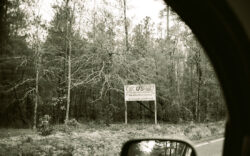I grew up in an old family home that still had the no-longer-used outbuildings on the lot: woodshed, smokehouse, chicken coop, pigpen, outhouse, cow lot. Those mute structures conjured the lives that had gone before us. They were fun to explore on idle summer afternoons and provided great hiding places after dark for kick-the-can. Once, while investigating the chicken coop, I found an old, half-full whiskey bottle. What was a whiskey bottle doing in a henhouse? I opened it and smelled the liquor, but at that stage of my life I had no interest in drinking it, so I left it where it was: a mystery bottled in an enigma.
Gradually, as family lore was revealed around the dinner table and afterward on the front porch, the picture focused. My banker grandfather died, the boll weevil arrived and the bank failed, impoverishing my widowed grandmother. Then her sister died, too, so she moved next door into the house where her father, my great-grandfather Merritt, had been living with her sister’s family. Joining her sister’s widower and his three children, my grandmother brought her own five, plus her husband’s father, my great-grandfather McCommons, along with my great-aunt Julia, who never was quite right. They were a big family, and they needed all those outbuildings for support.
If you are keeping score, that’s five adults and eight teenagers of various ages.
The crux of this story is that Grandpa McCommons, already widowed seriatim from two sisters, loved to drink and chase women. Grandpa Merritt was a staunch Baptist businessman and a teetotaler (did not drink). Neither did my grandmother approve of alcohol.
My father grew up in that household with the dueling authority figures; so did my uncles and aunts—some of whom were actually my double-first-cousins once removed, since their fathers married sisters.
I surmised that the bottle I found in the chicken coop might have been secreted there by Grandpa McCommons or by any of the cousins who gravitated toward his predilections, rather than to the straight and narrow path of Grandpa Merritt.
My father assimilated both grandfathers. He became a hardworking, responsible businessman, even a steward in the Methodist Church, and he would take a drink.
Now, you have to understand what taking a drink meant then. My father would come home from a long day at the store, and at the kitchen sink he would fill one of those little three-ounce fruit juice glasses with Canadian Club, drink it down, grimace, and chase it with a glass of water. That was his cocktail hour. Once, early on, when I asked him what he was drinking, he said, “Medicine,” and I suppose it was.
My mother’s Methodism was stronger. She would very occasionally accept a weak drink, though she didn’t really need it, and she tolerated his.
That was all before whiskey was legal in small towns, so my father, careful businessman that he was, always stocked up on Canadian Club any time he was somewhere like Atlanta. So, of course he became the go-to guy when his less forward-looking friends decided they needed to borrow a bottle.
They would all be incredulous at the plethora of alcohol available to us in forms they could never have imagined: the scrumptious craft beers, the varieties of wine—a drink they never knew, not even at communion—the whiskeys that deserve better than being tossed down at the sink.
Through my father, I carry both great-grandfathers within me, too. I am a former Methodist and a conscientious businessman whose livelihood has been decimated as if it were hit by the boll weevil. I enjoy taking a drink. I enjoy women, and I have the great good fortune of still being married to the last one I chased.
The moral of this story is that drinking can mirror life. What brings great pleasure can also bring great pain. The Greeks—little known where we lived, save through the Methodist preachers, our teacher Miss Mary Radford and the restaurateur, Charlie Poulos—emphasized, “Nothing in excess.”
That is the trick in drinking as in life: to enjoy our pleasures in just the right amount so that the thing that pleases us does not become the thing that brings us and others pain. Perhaps that is the message in the bottle somebody left in the chicken coop.
Like what you just read? Support Flagpole by making a donation today. Every dollar you give helps fund our ongoing mission to provide Athens with quality, independent journalism.










